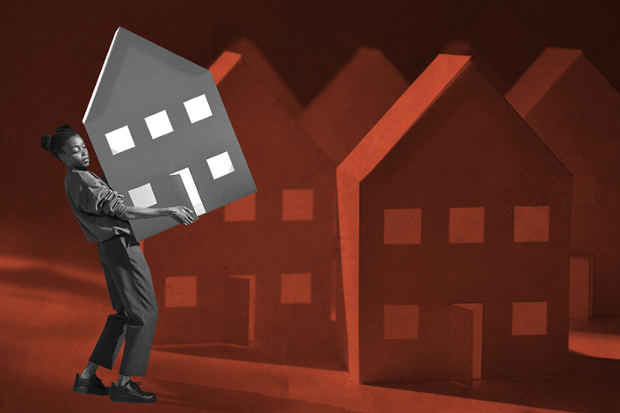How diversity can blind us to society's underlying racism
Sociologist Sarah Mayorga argues that even though well-intentioned, the pursuit of diversity can blind us to the underlying racism in society.
 Photo illustration by Jessica Tanny
Photo illustration by Jessica TannyFor much of the past two decades, associate professor of sociology Sarah Mayorga has examined what Americans, especially white Americans, mean by the term diversity.
For her 2014 book, “Behind the White Picket Fence: Power and Privilege in a Multiethnic Neighborhood,” she spent 18 months interviewing residents in the supposedly "integrated" neighborhood in Creekridge Park in Durham, North Carolina. (Creekridge Park is a pseudonym.)She came away with the conclusion that diversity was an ideology that enabled whites to only superficially commit to achieving social justice. "Diversity ideology dictates that intentions, as opposed to outcomes, are what truly matter," she wrote. It "does not demand that individuals take specific actions to promote inclusion or equity."
In recent articles in Sociological Perspectives and American Behavioral Scientist, Mayorga has expounded on her thesis, deconstructing diversity ideology to expose its underlying assumptions and contradictions.
She spoke with BrandeisNOW about her views on diversity and what she sees as a better alternative for achieving racial justice.
What do you see as chiefly wrong with diversity?
When we talk about diversity, it often becomes this performance of being "the good type of white person." We hyperfocus on the person's intentions.We stay in that first step of proving we're committed to diversity and never really follow through with the commitment. We don't ever really get to the conversation, "Okay, are our measures to promote diversity effective or not?"
And you feel this prevents us from having a more substantial discussion about racial justice?Yes. Diversity becomes about inclusion and tolerance — including everybody at the table — but without ever really talking about why the table looked that way in the first place. In other words, there's no discussion about how one group of people has been systemically privileged over others.
You've found that people really define diversity in all sorts of different ways.That's part of the problem, right? Diversity can have a wide range of definitions.
My colleague, Penn State University's Candis Smith, and I interviewed white millennials, and one of the things they said is you can have a room full of white men and it's diverse because they all have different interests or different life experiences.On the other hand, with the people I spoke with in North Carolina, it came from this well-intentioned place of wanting to have a diverse life where you're surrounded by individuals from different ethnic and racial communities.
In your work, you critique the idea of "diversity as commodity."In North Carolina, one of the ways that people talked about diversity in the neighborhood was around things like restaurants or spices at the grocery store. So it almost became this way in which diversity was something that you can consume.
You also talk about "diversity as pluralism."One of the limits of our current conceptualization of diversity is that it tends to focus on representation, like having a certain number of people in a room from different racial or ethnic backgrounds or having representatives from different groups at the top of the organization. Like these in and of themselves mean there's equity.
And what's wrong with that?Equity is actually a much more complicated thing. To have equity, you really need to talk about the way a place works and its fundamental founding values. It means naming a historical or contemporary racial harm and working to actively undo that harm.
And I think that that's a very different kind of interrogation. It makes sure things just don't go on working as they are.
Many of the white North Carolinians you spoke with felt their neighborhood was very diverse.
They said they wanted relationships with people from all over the neighborhood, regardless of whether they owned a home or not. And so they talked about how the neighborhood association meetings were open and everyone was welcome.
But the neighborhood association was 90% white homeowners, and they couldn't quite figure out why this was happening.What I found was that the neighborhood association sent out a newsletter, and they sent it out to every single home, but in the apartment complexes, which is where many Black and Latinx residents lived, they posted it in the common area. So that was like one small thing where everyone who was in a single family home got the newsletter delivered and in the apartment complexes, you had to know to look for it.
It wasn't necessarily intentional to exclude these groups, but it had the effect of reinforcing this idea that the neighborhood association was for homeowners.So this was a case of good intentions but bad implementation?
Yes. Saying we want diversity is different than actively trying to work with different communities and making sure that we're taking into account everyone's perspectives and needs. The neighborhood association members told me, "Well, the meetings were open, we didn't actively exclude anyone." But they needed to think more deeply about the effects of their policies.
What do you propose as an alternative to diversity ideology?I think we need to focus on anti-racism. Anti-racism is a really useful framework because it identifies structural racism and also how we need to be taking active steps against it.
I tell my students that we're all subject to the power of these broader racist systems and to undo that, we have to actively work against them. It's not just about an individual saying, "I'm not a racist, so, you know, I don't have to think about racism." It's really thinking much more deeply about all the ways in which we're implicated, every one of us, in the replications of these systems.
Categories: Humanities and Social Sciences, Research





